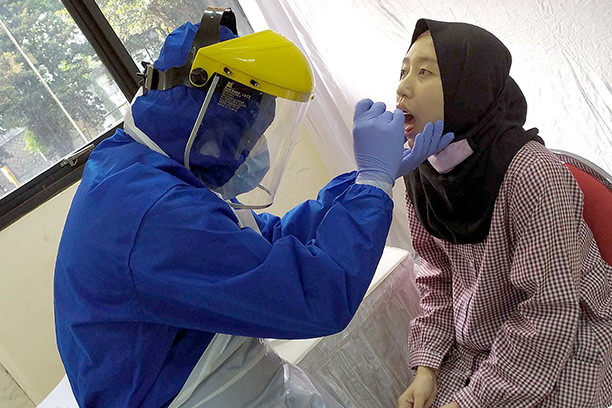Popular Reads
Top Results
Can't find what you're looking for?
View all search resultsPopular Reads
Top Results
Can't find what you're looking for?
View all search resultsUse antigen tests for screening but with caution: Experts
Change text size
Gift Premium Articles
to Anyone
A
mid persistent COVID-19 testing constraints, the government appears to be looking into using rapid antigen tests, which are cheaper and faster although less accurate than the gold-standard polymerase chain reaction (PCR) tests. Experts are on board but urge caution.
National COVID-19 task force spokesperson Wiku Adisasmito said the government was searching for better and more accurate alternatives to its current screening method of rapid antibody tests, whose inaccuracy experts have highlighted, and that it was considering antigen tests.
Wiku said on Tuesday that the government was aware of the World Health Organization's recommended list of rapid antigen test kits, which could provide results in less than 30 minutes.
PCR tests can take hours or even days to process in labs as testing backlogs remain common in the country.
"Certainly, antigen tests can be used in Indonesia as recommended by the WHO in order to replace rapid antibody tests, and screening with [antigen] tests can be more effective and won't be a burden on PCR tests as the gold standard in diagnostic tests," he said.
Antigen tests use nasal or throat swab samples to detect certain proteins on the surface of the coronavirus. These tests do not require advanced lab equipment and come in the form of paper strips resembling home pregnancy tests.
Antibody tests detect antibodies in blood samples – which may only develop weeks after infection and can form differently in people with certain conditions.
PCR tests detect the virus' RNA, making them more accurate than the other two tests, but they require specific laboratory safety measures, skilled workers and specific machines.
An insufficient number and uneven distribution of facilities that meet these requirements have been cited as reasons behind Indonesia's low testing rates compared to other countries. Long testing turnaround remains a problem, affecting containment efforts that require people to be tested, traced and isolated quickly.
Read also: COVID-19 leaves lab workers grappling with unprecedented testing scale
PCR tests that are not subsidized by the government can cost more than Rp 2.5 million (US$168) – prohibitively expensive for many Indonesians. Some 120 million antigen tests costing $5 each will be made available to poorer nations, the WHO announced on Monday.
The WHO said earlier that the use of rapid antigen tests could be considered in areas experiencing widespread community transmission, where it might not be possible to administer PCR tests or where test results faced long delays.
But experts have said that further confirmation by PCR tests is necessary, especially if someone tests negative but shows symptoms indicative of COVID-19.
Studies of antigen test kits of various brands cited by the WHO have shown that their sensitivity ranges between 0 and 94 percent, meaning the chance of false negatives could be high. But their specificity is consistently above 97 percent, meaning the chance of false positives is low.
“I agree [about the use of antigen tests] for early phases, during which the viral load is believed to be at the highest level,” said Aryati, a professor of clinical pathology at Airlangga University who also chairs Indonesia's Clinical Pathology and Laboratory Medicine Specialists (PDS PatKLIn) association. “It can be performed both on people with symptoms or without.”
Unlike PCR tests, which can detect even fragments of the virus, causing some people to test positive for months after symptoms disappear, antigen tests are believed to best detect the virus in patients with high viral loads. This means up to three days before symptom onset and within the first five to seven days of illness, according to existing, though limited, studies cited by the WHO.
Read also: Carry out proper mass testing with PCR, experts say
But since studies of the virus’ infectiousness over time are limited and require a more sophisticated viral culture, rather than simply relying on predicted viral loads, University of Indonesia microbiologist Anis Karuniawati said it was important to cautiously determine which populations were suitable for antigen tests. She said health authorities should consider what steps would be taken after results came back.
"Whether we want it or not, we need a method that allows us to detect [possible cases] even more widely," Anis said.
She said these tests could be used not only where testing was scarce but where quick results were necessary, such as for triage purposes at hospitals. These tests could be performed outside labs, although the transmission risk during the processing of the tests had to be studied first, she said, adding that tests should be performed and interpreted by experts.
The PDS PatKLIn has suggested that trained workers with personal protective equipment (PPE) perform the tests and that the samples only be processed at labs with level 2 biological safety cabinets and sufficient cold chain and infectious waste bins.
It was important to purchase the tests advised by the WHO, experts said, and those that were not on the list should be validated by Health Ministry labs or other labs planning to use them to ensure their quality – unlike what occurred with the existing and widespread rapid antibody test kits.
The WHO has recommended a minimum threshold of 80 percent sensitivity and 97 percent specificity for antigen test kits.
"Don't use just any [brand of test]. Use what's recommended by the WHO [...] There must be quality control and assurance. Don't jump into using them without the knowledge of clinical pathologists," said Herawati Supolo Sudoyo from the Eijkman Institute of Molecular Biology.










